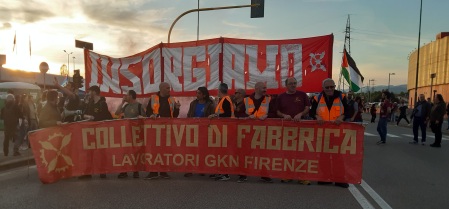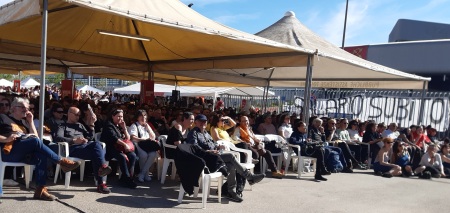Five thousand people joined a march in Campi Bisenzio, near Florence, on Saturday evening 6 April, organised by the sacked workers at the huge GKN factory, who have been fighting for two-and-a-half years to keep their workplace open under public ownership and workers’ control.

The dispute and the occupation of the factory continues, since an Italian labour court ruled against the final attempt to dismiss the 400 GKN employees just before the deadline of 1 January this year. Now, though, the workers are not receiving any wages.
The demonstration at the weekend was called by the workers’ Collective in response to an attack on the occupied factory by the management, the most likely organisers of a break-in in the early hours of the morning last week to cut off electricity to the plant.
The Collective was set up in 2017. In July 2021 Melrose, the owners of GKN, announced that they planned to shut down the factory and sell it off to property developers. Since then, the Collective has become a nucleus for a campaign that has won wide support in the climate justice movement and in the community.
The ex-GKN Collective has argued forcefully and convincingly, with the participation of academic researchers, for a just transition away from the factory’s former role of turning out car axles, towards the production of socially useful items such as cargo bikes and solar panels, vital in the battle to save the climate.
Campi Bisenzio is typical of the working-class areas near Florence, with a strong radical tradition, including support for the Resistance during the Second World War. (Stuart Hood (1915-2011), the Scottish writer and broadcaster who fought with the partisans, recalled in his memoir Pebbles from My Skullthat his partisan group in the hills overlooking Campi could rely on its inhabitants for food and arms.)
The attack on the factory, and the electricity cut-off, was the culmination of weeks of intimidation against a Festival of Working Class Literature held outside the factory at the weekend. It had been threatened with being banned, on the ludicrous grounds that it was an illegal “rave party”.
But the Festival went ahead, attended by thousands of predominantly young people, some of them students from Florence, Bologna and other universities who have been volunteering with the workers’ collective for two years. It was full of life, with impressive sessions by committed speakers on working-class writing internationally.
A drone – suspected to be operated by a management stooge – could be seen spying on the Festival throughout the weekend.
There was a talk by the English author Anthony Cartwright on his novel How I Killed Margaret Thatcher, a semi-autobiographical reflection on the catastrophic deindustrialisation of the Black Country in the Midlands during the 1980s.
Film director Ken Loach sent a message of support, saying: “The GKN project demonstrates that the exploiters need us, but we don’t need them … You are setting an example that we all need to follow.”
In an inspiring collaboration between the occupying workers and the climate justice movement, the Collective announced the day after the Festival that solar panels had suddenly been installed over the weekend in the factory car park – something the management had promised, but had not accomplished, in ten years.
The panels, they said, had been brought from Germany by climate activists and were customised on the spot by the occupying workers, providing an alternative source of power to the sabotaged electricity supply.
The Collective is appealing for financial support and for subscriptions to a co-operative ownership scheme for the factory. Full details of this, and a recording of an excellent recent webinar on the campaign (in English), are here.
Source >> People & Nature blog
Art (54) Book Review (127) Books (114) Capitalism (68) China (81) Climate Emergency (99) Conservative Government (90) Conservative Party (45) COVID-19 (45) EcoSocialism (60) Elections (83) Europe (46) Fascism (62) Film (49) Film Review (68) France (72) Gaza (62) Imperialism (100) Israel (129) Italy (46) Keir Starmer (56) Labour Party (115) Long Read (42) Marxism (50) Marxist Theory (48) Palestine (179) pandemic (78) Protest (154) Russia (341) Solidarity (146) Statement (49) Trade Unionism (142) Ukraine (349) United States of America (134) War (370)


